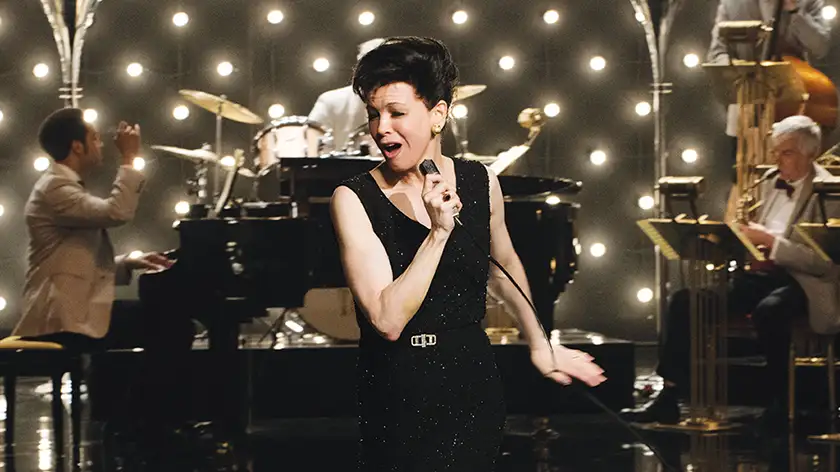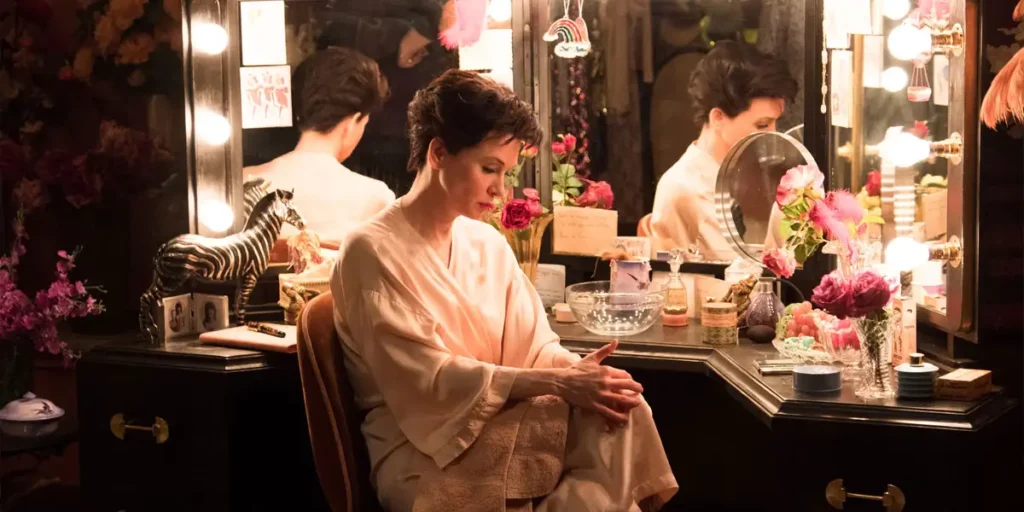Part religious portrait and part heartfelt tribute, Garland biopic Judy rewrites the star’s past, finally placing her on the right side of history.
There couldn’t have been a better time to release Judy, the biopic that documents the final year of star Judy Garland. We all know bits and pieces about the icon and her life, upon which we have already formulated our opinions. Starting off as an extremely talented child actor and singer, she had her fair share of fame, married many times, she then became a drunkard and drug addict, and died at an early age. Well, biopic Judy is here to fill the gaps, and Renée Zellweger is your tour guide.
Judy is a retrospective on the star’s final year, and guides the audience through the complex labyrinth of her life. If I call the film a retrospective is because it’s like an exhibition in an art gallery. By choosing to expose the later works – her last year as a cabaret-restaurant singer in London – director Rupert Goold expresses his desire to explore her life starting from the very end of it, the finished work. What brings all the pieces together is the use of three major flashbacks which take us back to the set of The Wizard of Oz, when Garland, interpreted by Darci Shaw, was only 16. The movie’s structure is simple: the main storyline follows Judy in 1968 in her late 40s, then, as soon as she does something that we may frown upon, we see Judy in 1933 on the film set, so that we can interpret the meaning behind her behavior.
The two timeframes are harmonically juxtaposed; the transition comes through as pleasant. 1933 is only depicted through the film set, so everything that surrounds young Judy is artificial and bitterly ironic. Almost at the beginning of the film, a vivid scene takes us through Judy’s 16th birthday, which is celebrated two months in advance due to “scheduling issues”. A tasty cake lies on the table, but she can’t eat it because it’s fake. Not only that, but attending her fake birthday party are also many boys and girls that she doesn’t know, together with an ornamental swimming pool right by the film set. Against all odds, Judy decides not to play by the rules and dives in it.

An interesting aspect lies in the incisive contraposition between the artificiality of the setting that 1933 Garland finds herself in, and the raw reality of 1968 Garland, which sends across a cry for help. Another important aspect that we learn from the flashbacks is that not only did the director of Oz psychologically abuse her, but he also abused her physically. That’s why now is the perfect timing for the film to come out; because of history, because of 21st century feminism and because of the Metoo movement. Women are beginning to be heard and believed. When Garland first spoke, nobody would listen to her. Now, everyone has to hear her out, and having Renée Zellweger’s voice as a means is really incisive.
Zellweger’s acting is, as always, outstanding: she’s majestic as she walks around the stage, and also an incredibly talented singer. There is, however, something that doesn’t quite work out with her interpretation- for the film’s overall economy. While you are supposed to see Judy moving around the screen, at times – too many times – all you can see is Zellweger playing Judy. The mediation isn’t always successful and sometimes it’s also confusing; it could be due to the excessive pathos that the actress brings to the character in her darkest moments. Zellweger, however, is not the only one to blame. This insistence upon self-reference brings back a distorted portrait of the artist: a hagiography of sorts. Oftentimes the character becomes a parody of itself and forgets to be human and faulty. It’s such an affectionate tribute that it tends to neglect the necessity of staying unbiased. Overall, the character is kind of a flash in a pan.
The melancholic patina that permeates the film, together with the directorial cuts, take the audience back to the film Jackie, the 2016 biopic with Natalie Portman interpreting Jacqueline Kennedy Onassis on the year after JFK’s assassination. That’s why Judy doesn’t exactly come across as new material, but at the same time it’s still gratifying to watch because of its being built on a space already known to the audience. Sophisticated aesthetics are often balanced with more popular and funny moments. There’s a storyline that adds up and that scrutinizes Garland’s relationship to her gay claque. Renown as a gay icon because of her camp style and because of her tragically caricatured figure that embodies the struggles of the community, the film also winks at that. There’s no real story behind the movie; there’s just life, a slice of life, as embellished as it may be. In fact, the costumes, the setting, every single embellishment appears to belong there, and poetically adorn the tragedy.
Yes, Judy is a lot. It’s an intense journey, but it’s about extremes finding balance in the end. Or at least, most of them. We’re still challenging you to tell the moments of Zellweger as Garland and those of her just as Zellweger apart!
Judy (2020) is now available to watch on digital and on demand.

